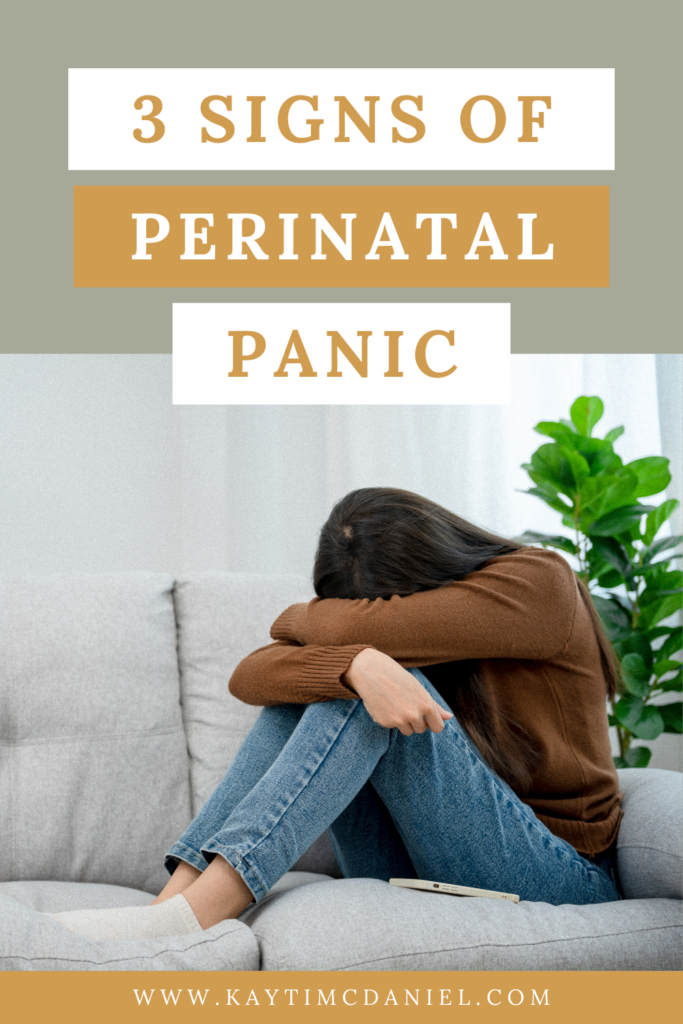
What is perinatal panic disorder?
Perinatal panic disorder is one of several perinatal mood and anxiety disorders (PMADs) that can show up during pregnancy and/or the postpartum year. Perinatal panic disorder includes prenatal panic disorder during pregnancy and postpartum panic disorder after birth.
Panic attacks under any circumstance can feel super scary. Panic attacks during pregnancy or that first year with baby takes that already-scary experience and makes it even more intense. Something EVEN WORSE? Not understanding what’s happening or how to help yourself feel better. In this post, I’m hoping to address that “what’s happening?” question by sharing a bit about perinatal panic disorder (which could be one possible explanation for your panic attacks).
Here are 3 signs of perinatal panic disorder:
1. You’re having panic attacks.
Panic attacks can look and feel different from one person to the next and from one panic attack to the next. But they’ll typically have some combination of the following symptoms:
- racing or pounding heart
- sweating
- trembling or shaking
- shortness of breath
- feelings of choking
- chest pain
- nausea or upset stomach
- feeling dizzy or light-headed
- feeling very hot or very cold
- numbness or tingling sensations
- feeling detached from reality
- fear of “going crazy”
- fear of dying
Panic attacks come on suddenly, intensely, and peak within a few minutes. If you’ve ever had a panic attack, then you know that this experience can feel absolutely terrifying. If you have had a panic attack more than once, it could be a sign of perinatal panic disorder.
2. Your panic attacks are unexpected.
Panic attacks associated with perinatal panic disorder are not consciously triggered by a specific experience. If your panic attacks are expected, then they may be better explained by another mental health diagnosis. For example, if your panic attacks are specifically triggered by social situations, it could be a sign of social anxiety disorder. If you have panic attacks when you come across reminders of a traumatic birth experience, this could be a sign of PTSD. Panic attacks can show up in the context of any mental health diagnosis.
Important note here — panic attacks of any kind for any reason are deserving of support. The label may not matter at all to you (and sometimes, it really doesn’t need to). But for the purposes of this video and learning about perinatal panic disorder specifically, keep in mind that panic attacks in this case usually appear more random or “out of the blue.”
3. Your panic attacks are getting in the way of your life.
If you read my last post about perinatal anxiety, this may sound familiar. It’s entirely possible to have a panic attack in a challenging moment, recover from that challenging moment, and then carry on as usual. It’s also very possible (and very human) to have a panic attack, be totally freaked out by it, and do your very best to make sure it doesn’t happen again.
Let’s say one of your panic attack symptoms was a pounding heart. In this case, you might avoid high-intensity exercise specifically to avoid that sensation, which you now associate with panic attacks. Maybe you had outwardly visible symptoms like getting really sweaty, hyperventilating, or feeling dizzy — if you’re really embarrassed at the thought of someone seeing you during a panic attack, you might avoid social situations. Or maybe your latest panic attack had you questioning your sanity, or feeling as though you were “going crazy.” You might be afraid to be left alone with your baby (or left alone at all).
These are just a few examples. And, again, totally human to want to regain control in a situation where you’ve felt out of control. That being said, if these panic-attack-related attempts at control lead you to avoid important parts of your life, it could be a sign of perinatal panic disorder.
Are you noticing signs of perinatal panic disorder in yourself or someone you love?
If you’re noticing any one of these signs of perinatal panic disorder, consider reaching out to a therapist trained in perinatal mental health. Therapy can help you learn to recognize, manage, and reduce panic attacks so that they aren’t controlling your decisions any more — you are.